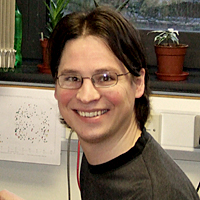Biography
I am a Lecturer in Astrophysics at Keele University, where my research interests are planetary systems, binary stars and pulsating stars. I also dabble in music and public outreach. I also do lots of things to help the scientific community, e.g. refereeing papers and grant applications, telescope time allocation committees, supervising PhD students, PhD thesis examination, writing white papers, IAU Commissions, writing computer codes, etc.
My first degree was a Masters in Astronomy and Astrophysics from the University of St. Andrews. I then came to Keele as a PhD student in 2001, and graduated in 2006 with a thesis entitled Eclipsing Binary Stars in Open Clusters. My first postdoctoral position was at the Niels Bohr Institute in Copenhagen. After this I moved to the University of Warwick for four years, before returning to Keele in 2010 for my third postdoc. I was subsequently awarded an STFC Advanced Fellowship, and became a lecturer at Keele in 2011.
I now lead three modules and am involved in a fourth in the Keele physics and astrophysics degree offering. I have also managed to accumulate plenty of other responsibilities along the way, including chairing the Sustainability Committee for the School. This makes life interesting but sometimes logistically complex.
Further information on me can be found on my personal homepage.
Research and scholarship
My main research area is the study of eclipsing binary stars. These objects are vital to our basic understanding of stars, and thus galaxies and the Universe, because they are the only ones for which we can accurately measure fundamental properties such as mass and radius. Understanding the real-life properties of stars allows us to model them and investigate their structure and evolution. My work on eclipsing binaries is mainly directed towards those observed using space satellites such as Kepler and TESS, in particular those which contain a pulsating star. I will be responsible for running the eclipsing binary program for the PLATO satellite, to be launched in 2026, and this will take up most of my research time in the near future.
My other research area is extrasolar planets. These are currently a big subject in astrophysics, as we struggle to understand where our own Solar System came from, how similar it is to planetary systems around other stars, and how many planets are there that might support life. I am primarily interested in transiting extrasolar planets: ones which periodically pass in front of their parent stars as seen from Earth. From observations of these planets we can precisely determine their masses and radii, and so understand the properties of planetary systems in general. A lot of my observations are done with telescopes deliberately driven out of focus, which is a surprisingly effective way to get good data.
Besides this I supervise PhD students (my sixth recently started), examine PhD theses, write white papers for the community, write software for the analysis of eclipsing binaries and transiting planets (see JKTEBOP), maintain catalogues of transiting planets (TEPCat) and eclipsing binary stars (DEBCat), referee papers, referee grant applications, and referee telescope applications. In the past I have been a member of telescope time allocation committees for the ING and LT, and the Secretary of Commission G1 of the International Astronomical Union.
Teaching
I lead the 2nd-year module PHY-20026 (Statistical Mechanics and Solid State Physics). This is a core physics module taken by all our 2nd-year students and comprises 24 lectures plus problems classes and problems sheets.
I lead the 3rd-year Dissertations module (PHY-30015 for physics students and PHY-30017 for astrophysics students). This is a core module for single-honours students and for combined-honours students majoring in physics or astrophysics. Each student chooses a topic on which to write a 4000-word dissertation, present a poster, and give a 10-minute talk.
I developed and lead PHY-30024 (Binary Stars and Extrasolar Planets), which is an options module for 3rd-year students. This one is good fun and tackles one of the areas of astrophysics where there is a lot of interest from the general public.
I also participate in the teaching of PHY-30006 (Astrophysics Project), a module that is run by Dr Pierre Maxted, as well as various other responsibilities (e.g. personal tutoring).
Publications
School address
Lennard-Jones School of Chemical and Physical Sciences
Lennard-Jones Building
Keele University
Staffordshire
ST5 5BG, UK
Phone (School Office): +44 (0)1782 733033, (Chemistry): +44 (0)1782 731693, (Forensic Science): +44 (0)1782 731694, (Physics): +44 (0)1782 733527
Email: scps@keele.ac.uk
Information for schools and colleges
Programme directors
Chemistry and Medicinal Chemistry
Dr Tess Phillips
Tel : +44 (0)1782 733038
Email : t.r.phillips@keele.ac.uk
Dr Chris Hawes
Tel : +44 (0)1782 732820
Email : c.s.hawes@keele.ac.uk
Forensic Science
Dr Jamie K. Pringle
Tel : +44 (0)1782 733163
Email : j.k.pringle@keele.ac.uk
Physics and Astrophysics
Dr Arumugam Mahendrasingam
Tel : +44 (0)1782 733312
Email : a.mahendrasingam@keele.ac.uk
Admission tutors
Chemistry and Medicinal Chemistry
Dr Natalie Capel
Tel : +44 (0)1782 733584
Email : n.j.capel@keele.ac.uk
Forensic Science
Dr Natalie Capel
Tel : +44 (0)1782 733584
Email : n.j.capel@keele.ac.uk
Physics and Astrophysics
Dr Patrick Connell
Tel : +44 (0)1782 733892
Email : physics@keele.ac.uk or p.j.connell@keele.ac.uk


